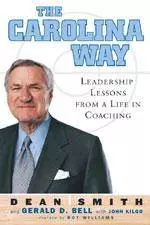University of North Carolina Athletics

The Carolina Way By Dean Smtih - Introduction, Part 2
January 27, 2004 | Men's Basketball
Jan. 27, 2004
Part 2
I believe it's accurate to say that the most effective leaders have these things in common: the talent to create a sound strategy for their teams or businesses; knowledge of the importance of recruiting good people who wish to improve their personal skills and believe in the companies' or teams' philosophy; understanding that whether they like it or not, they lead by example; belief in the importance of being light enough on their feet to adapt to changing conditions; and the ability to honor their commitments, admit their mistakes, and take responsibility for their failures.
It's also true that leaders in virtually all professions must learn how to compete. Obviously I'm a competitive person, or I wouldn't have coached basketball at North Carolina for thirty-six years. I enjoyed having our team go against the best teams in the nation. The games were like a test. We used the games to measure our progress and see how we stacked up against the best teams in America. All leaders, not just coaches, must learn how to compete effectively, because the competition is looking for ways to beat them. While we talked with our players about the process and not about winning, that didn't mean we didn't want to win. Winning was important to us, very important. But when we did our best and lost, we accepted it, congratulated our opponent, and worked hard to improve. Leaders must know how to bring their teams back from defeat.
Even though I was convinced (with some reservations) that this book done properly could be useful, I wouldn't have done it without Jerry's contribution. I'm a coach, not a businessperson, an artist, or a doctor, and it would have been presumptuous of me to tell people in those and other professions how they could make the Carolina Way work for them. Jerry has worked closely with leaders in business and many other professions, and he's well qualified to examine what we taught and explain how it could be transferred to other professions. He's done that brilliantly in this book, which I'm proud to coauthor with him.
My role was to write about the things we taught at North Carolina, and why. Jerry, under the heading of -Business Perspective," explains how others can take those lessons and training strategies and put them to good use in their own jobs and leadership activities. When you read the section on teamwork and team building, you'll see that we had many rituals that we used. They didn't start out as rituals but were initially put into play to answer needs. They became part of our program and eventually as familiar as Thanskgiving dinner with the family. I do think rituals assist in team building.
The player perspectives that appear in each chapter were the idea of John Kilgo, who gave this book its form. When he first approached me about having the players give their lasting impressions of the way we taught, I vetoed it, even though I knew the information could be interesting and valuable. I just believe these men have been asked about me so much that they must be tired of talking about me after all these years. Nevertheless, John Kilgo was persistent, and with allies Scott Moyers, our editor, and Jerry, I was outvoted 3-1. However, I did ask John not to call on some of our most famous players who have been asked about me time and again for years and years. Having said all that, I am convinced that the players have a perspective that we couldn't get from any other source. Not having them participate would have left a void and made the book less than what it is. I agreed to go along with it, but only with the clear understanding that it was John who chose which players to interview, did the interviewing, and then wrote their comments. I never favored one player over another and wouldn't have known how to include this one and leave that one out.
In retrospect, I'm convinced that having the players be part of this project was a good idea because what they have to say adds a great dimension to the overall work. They were students in the classroom known as North Carolina basketball, and their observations provide the thread that ties the entire book together in a way that would otherwise be impossible. They provide readers with a strong perspective. These are smart, successful men who have made valuable contributions to society in many walks of life, including teaching, medicine, law, athletics, and business. Candor is one of their many good traits. Everyone can learn something valuable from them. Of course I wish we had the space to interview every player who ever played for us at North Carolina. That would be a worthwhile book unto itself. Meanwhile, I hope The Carolina Way provides you with some ideas that will help you in your work.
-Dean Smith
June 25, 2003




.png&width=36&height=36&type=webp)





